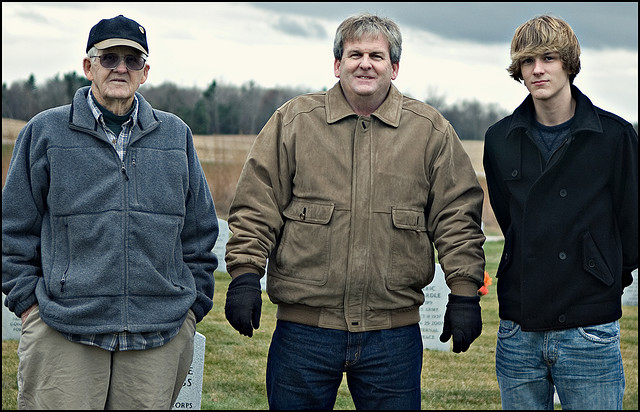One of the most influential people in my life is definitely my granddad. He’s influenced every part of me: my faith, my mental makeup, my sense of humor, my facial hair…all of it.

He’s also a member of the little discussed Silent Generation, the term for those born in the brief window between the Greatest Generation (those who lived all the way through the Great Depression and fought World War 2) and the Baby Boomers (brought about by the homecomings of those who fought in World War 2).
He lived for decades before the advent of the personal home computer. And here I am, his grandson and a Millennial. I’ve not known a world without computers. Heck, my brother won a Nintendo in a competition when I was seven days old. I was born a little less than halfway through the first truly digital generation.
I’ve been getting newsletters from several young adult/millennial publications for a few years now, most of them Christian. If I were to believe the articles published by many of them, everything wrong with this world is the fault of my granddad, or his parents, or my parents. According to these articles, my granddad blames my generation and those younger than me for everything wrong in the world.
Instead, this is simply not the case. People can’t be boiled down to a bullet list of attributes supposed to describe everybody in a roughly twenty-year period. I have much in common with the “average” Millennial, but I also differ greatly from them.
We seem to live in a culture of generational tension, but I’m sure it’s not a new thing. Think about what it would have been like a couple of generations after the Israelites were taken into captivity. You have the older generation who remembers life in Jerusalem and walking the temple grounds. They have something tangible to make their faith in the Lord real. They saw the heritage of their faith and culture with their own eyes. It’s real to them.
Now imagine the first generation born and raised in captivity. They have the stories and scriptures recited by their elders, but what they see with their eyes is a foreign culture and a foreign religion. Imagine how difficult it is to believe their elders professing the sovereignty of God when all they’ve known is subjugation. In the matter of decades, circumstances changed so drastically to cause inherent friction between the age groups. This is, sadly, natural. But we can’t let it damage the connections we should develop with our physical and spiritual elders.
I’ve known people who left a church that was where they needed to be because they didn’t want to “worship with old people.” I once heard a pastor talking about a church that cut its college ministry because older members of the congregation thought there were too many young people coming to the church. Both circumstances are a flat out shame.
My granddad was instrumental in my life just like all of my grandparents, my parents, and my siblings. I’ve also known men of all ages who helped me grow immensely; few of them were close to my age. If I wrote them off as members of an outdated generation I shudder to think where I’d be.
There’s another issue with this, too. If we allow ourselves to get to a point where we’re shifting blame up and down the generations, we fail to be accountable for things that are actually our fault. Yes, the Bible says that the sins of the father will affect the sons. Most times when I hear that being quoted it’s someone complaining about how something done in the 50’s ruined the modern world. Something we’re doing today could do the same thing. My generation is rapidly becoming the next round of fathers and mothers in this world. We are accountable for the impact we’ll have on our kids.
So why don’t we choose to do something different? Instead of griping about that “old fogy” or “kids these days,” why don’t we see them as people with a wealth of knowledge and people needing a teaching? Why don’t we stop assigning blame and start doing things that will set a good example for our descendants? It makes no sense to reinvent the wheel if our elders have already done so. It would be a crying shame if we tried to force those coming after us to do the same.
There will be some major differences but we need to seek out the commonality, our faith in Christ.
Photo credit: Mitchell Joyce